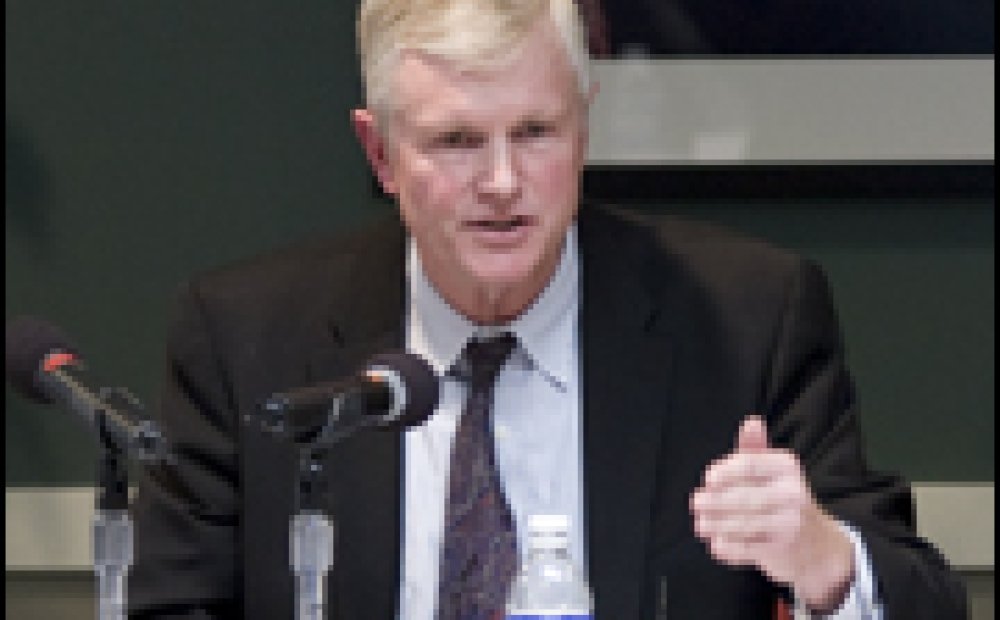Book Launch: <i>In Praise of Deadlock: How Partisan Struggle Makes Better Laws</i>

Former Wilson Center Public Policy Scholar W. Lee Rawls told an audience here Oct. 19 that contrary to conventional wisdom, partisanship in Congress produces better laws than would be the case if a single party dominated the process. This is because the Senate filibuster, which so many condemn as causing legislative gridlock, actually forces the majority party to negotiate with the minority, thereby ensuring a more deliberative and inclusive policy process.
Rawls, who began his career in Washington in 1971 with the Environmental Protection Agency, and went on to serve as chief of staff for Senators Pete Domenici (R-N.M.), Bill Frist (R-Tenn.), and for F.B.I. Director Robert Mueller, as well as serving with several private sector lobby shops, said that, contrary to popular opinion, things are not more partisan and vicious today than in earlier times. "Congress was much more partisan and confrontational during periods of the nineteenth century than today." He also differed with those who yearn for "a golden age" of Congressional civility and cooperation that never was. The very nature of the institution, he argues, has always been based on partisan competition, and that has always brought out emotional debates over important issues. Rawls said he disagrees with the "doom and gloom" crowd who think our system is rapidly deteriorating due to the corrosive partisanship. Citing a study by political scientist David Mayhew, Rawls noted that Congress has produced just as many landmark laws under divided party government as it has under unified party government. When parties share in the act of governing, both feel a responsibility to succeed if they are to be reelected. Competition is good for the system, he argued, not bad.
Former Senate Historian Richard A. Baker praised Rawls for writing a lively and entertaining book that helps bring to life the processes of Congress through concrete examples he experienced while serving in the Senate. Baker disagreed, however, with Rawls's notion that the filibuster was ushered in by a "mistake" or "mutation" in the rules in 1806. "The Senate made a conscious decision to eliminate the previous question motion" (a vote that ends debate), said Baker, "because they considered the motion superfluous." It was only much later in the century that filibusters, or extended debate, began to emerge over issues surrounding the civil war. Baker said when President Woodrow Wilson forced the Senate back into session in 1917 to adopt a cloture rule permitting a two-thirds vote to end a filibuster (since changed to 60 votes in 1975), the rule the Senate first adopted proved to be ineffective. It wasn't until later that the Senate tightened it up.
Richard E. Cohen, congressional correspondent for The National Journal, also praised Rawls's book, though he admitted as a journalist he falls more into the "manic-depressive," "doom and gloom" school of skeptics that Rawls point to--people who question just how productive fierce partisanship is. Cohen said Rawls tended to give too much credit to the House Rules Committee as an independent procedural force, when in effect it has long been an agent of the Speaker. Nevertheless, he agreed that the House is much more efficient than the Senate because the majority can severely restrict debate and amendments by using the Rules Committee.
Cohen concluded that he wasn't quite sure what to make of health reform under Rawls' thesis that only incremental things can be accomplished under the current politics and processes of Congress. If Congress passes a broad health care bill with little or no Republican support, does that defy the logic of the book? Rawls responded that the book was written before Democrats had achieved the magic number of 60 votes needed to overcome a filibuster. "I was thinking there would usually be 40-plus minority party members of the Senate," said Rawls, so this does introduce a new dynamic. Still, as one former Senate staffer in the audience observed, "If I were advising the president and Senate Majority Leader Harry Reid (D-Nev.), I would strongly urge them to use reconciliation for health care," since that only requires a majority vote for passage because debate is limited to 20-hours, thereby removing the need for 60-votes to end debate.